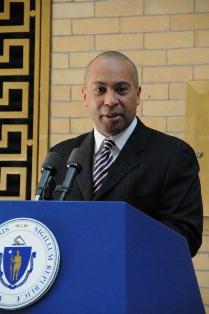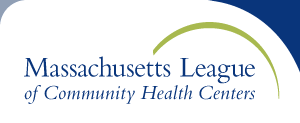
3-9-12 Feature Story:
Governor Deval Patrick, Executive Office of Health and Human Services Secretary JudyAnn Bigby, MD, House Majority Leader Ronald Mariano and Health Care Financing Chair Steven Walsh joined with the state's 50 community health centers on Thursday, March 8 to promote their quality, cost-effective model of care and ongoing role in health reform efforts.
Addressing a crowd that included health center administrators and clinicians as well as legislative aides and health center advocates, the Governor praised the role of health centers in pioneering preventive and patient-centered models of care and called them a "solution" to state efforts aimed at reducing health costs and improving health quality for Massachusetts' residents.
Community health centers have played a critical role in the implementation of Massachusetts' health reform law. Since the law was launched in 2006, the state's health centers have expanded their hours of operation, increased capacity to handle urgent health care needs and added 100,000 new patients to their ranks. The Commonwealth's health centers have done this with remarkable efficiency. Between 2007 and 2009 health centers received an average rate increase of 4.6 percent for the services they provide to nearly 800,000 state residents. Over the same time period, the median annual private insurance premium cost for families jumped 10 percent while costs borne by small employers rose 12 percent.
Nationally, health centers are recognized as one of the most successful public programs ever created, with thousands of studies documenting their quality care, ability to keep costs down for Medicaid and other insurers, and role in creating jobs in economically challenged communities. According to a recent study by the George Washington University, health centers generate annual savings of $24 billion ($1,263 per person) as a result of reducing the rate of preventable hospitalizations, inpatient days, and emergency room use across the health system.
Because of their time-tested, comprehensive approach to health care that saves money and improves health, community health centers are the cornerstone of the President's efforts to grow the nation's primary care infrastructure. The expansion strategy includes increasing health center services and sites of care, and doubling the number of patients served by them from 20 to 40 million by 2015. With ongoing fiscal uncertainty at the federal level - particularly around the fate of the national health reform law - community health centers remain at risk for cuts that could impact their ability to sustain and grow services in Massachusetts. Advocates called on state leaders yesterday to make investments in their facilities, workforce and care initiatives that will allow them to continue delivering their quality, cost-effective care to one out of eight state residents.
Over 200 representatives from more than 30 health centers attended the annual event, which included a morning legislative briefing with EOHHS Secretary JudyAnn Bigby, MD and a community health center exhibit fair in the State House Great Hall highlighting their comprehensive, patient-centered care.












